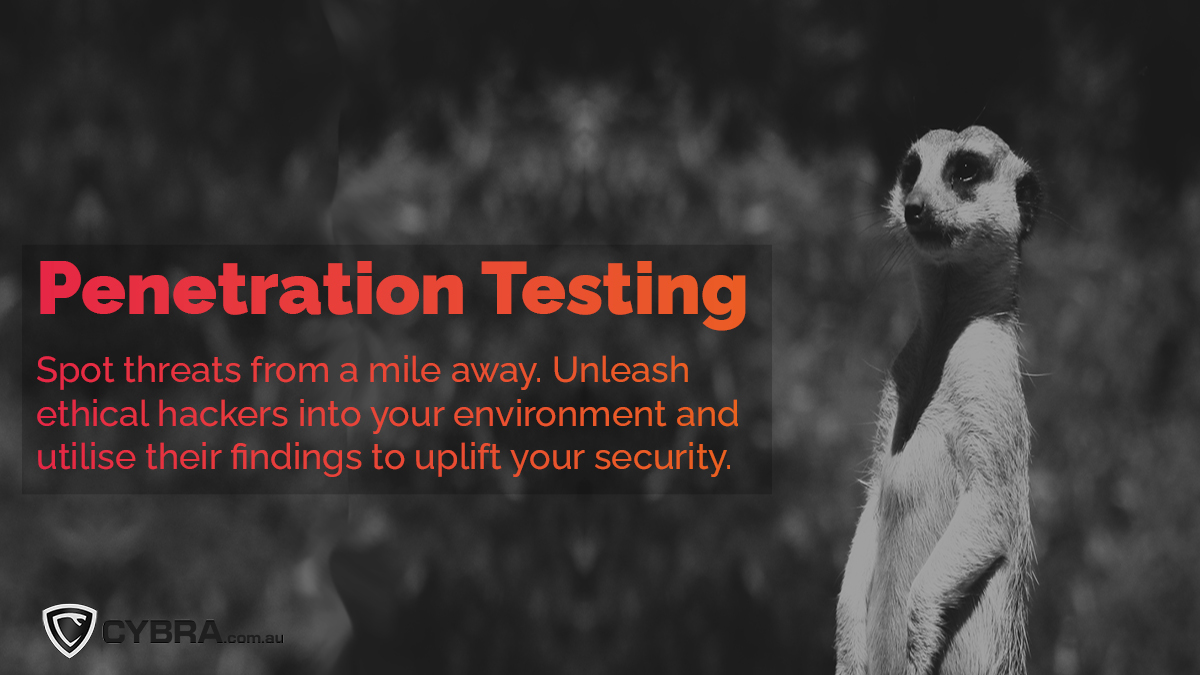Our Penetration Testing Services in Australia
Our world-class offensive security testing services are available to Australian customers.
External Penetration Test
Internal Penetration Test
Wireless Penetration Test
Cloud Penetration Test
Physical Penetration Test
Red Team Penetration Test
Phishing Penetration Test
Mobile App Penetration Test
Baseline Penetration Test
Secure Code Review
Active Directory Penetration Test
Security Configuration Review
Social Engineering
Vulnerability Assessment
Network Segmentation Test
Verizon Data Breach Investigations Report 2023
Don’t become the latest statistic
Why not perform a pre-emptive, safe and controlled attack on your business, and use the outcomes of the assessment to plug your security holes before a real attacker finds and exploits them.
Penetration
Testing Services
The BEst Penetration Testing Companies in Australia
Cybra’s vast penetration testing portfolio places us among the top penetration testing companies ion Australia. We covers all corporate and enterprise-grade systems, networks and applications. Our consultants are not only certified with globally recognised certifications, but have decades of experience consulting in all business verticals and industries, allowing us to use our experience to provide you with unrivaled customer service and tailored services to meet your specific security requirements.
We perform web application penetration testing against all types of websites. The goal of a web application pentest is to assess the security controls deployed to protect your application, and if those controls are sufficient in meeting your risk appetite.
Web application penetration testing can be performed as unauthenticated (anonymous) and authenticated users. Coverage can simulate external threat actors, malicious insiders and any specific user roles present within the application.
Testing follows industry testing standards such as OWASP Testing Guidelines and Penetration Testing Execution Standard (PTES). Our tester’s are also CREST certified.
Some examples of why you might need a web application pentest:
1) You run an eCommerce site and accept customer credit card information, meaning you require annual penetration testing under the Payment Card Industry Data Security Standard (PCI DSS);
2) You are developing a new application that will be released into production, and want to identify any security risks before go-live so that your team can remediate any vulnerabilities;
3) You are concerned that your site may be vulnerable to being hacked, and want visibility into your current level risk so you can apply appropriate security controls;
4) You are concerned that your site or customer data may have been breached, and required ethical hacking services to help identify if a breach has, or will occur;
5) You practice good security hygiene and like your systems to be as secure as practical.
An organisation’s Internet-perimeter is defined by an organisation’s external network, residing outside of your primary gateway/firewall. The Internet-perimeter consists of your publicly allocated and routable IP addresses and typically made up of firewall interfaces, VPN interfaces, DMZ websites, E-Mail, NAT’d services.
Internet-perimeter penetration testing can also be known as External Network Penetration Testing or Attack Surface Penetration Testing. We follow industry testing standards such as the Penetration Testing Execution Standard (PTES) and NIST. Our penetration testers are OSCP and CREST certified.
There are several benefits to undertaking an Internet-perimeter (or external) pentest, including:
1) Identifying which network services are being exposed to the Internet. E.g., have assurance that the firewall is not misconfigured and unnecessary or vulnerable services are being exposed to attack;
2) Get visibility on what your network is exposing to the Internet, and analysis of how secure those services are and if you are at risk of being compromised by a remote threat actor.
3) To meet compliance obligations. Many international standards, such as PCI DSS require annual external penetration testing in order for you to remain compliant;
4) You practice good security hygiene and like your systems to be as secure as practical.
An internal network is typically the nerve centre for an organisation’s information systems. An internal network consists of staff workstations, servers, corporate systems and applications, network devices, voice systems and more. Many organisations invest heavily in securing their Internet-perimeter but often overlook securing their internal network and systems. Internal networks are becoming easier to compromise by attackers due to social engineering attacks such as phishing. If a staff member clicks on a malicious email, your perimeter firewall may be bypassed completely and now an attacker has a foothold inside your network.
We follow industry testing standards such as the Penetration Testing Execution Standard (PTES) and NIST. Our penetration testers are OSCP and CREST certified.
Some benefits to conduct an Internal Network Penetration Test include:
1) Get visibility to your organisation’s risks and vulnerabilities;
2) Validate if your security controls are working, such as effective vulnerability and patch management;
3) Get a clear understanding of where your security gaps in your network are so they can be patched before they are breached.
The huge surge in mobile applications and smart phone usage has introduced a new breed of threats to an organisation. Like web applications, mobile applications often hold private and sensitive information, and have backend access to application and database servers.
We follow industry testing standards such as the OWASP Mobile Security Framework Testing Guide and Penetration Testing Execution Standard (PTES). Our penetration testers are OSCP and CREST certified.
You may like to conduct a Mobile Application Penetration Test if:
1) You are developing a new mobile application and require security testing to ensure no vulnerabilities exist before being released to the public;
2) You are an organisation that is looking to purchase a software product that includes a mobile application that can be used by staff, and you want to assess if it’s introduction into your environment will pose any risks.
Many organisation’s are moving applications, systems and infrastructures to the cloud. With this mass adoption comes a new breed of security risk. A cloud penetration test in general terms is the same as traditional penetration tests, just moved from your on-prem environment to your cloud infrastructure.
Cloud penetration testing can be external (internet-facing) and internal (within your tenant). We follow industry testing standards such as the Penetration Testing Execution Standard (PTES) and NIST. Our penetration testers are OSCP and CREST certified.
Cloud penetration testing can include:
1) Assessing the security controls deployed on SaaS solutions, such as E-Mail and Directory services, MFA, Access and authorisation controls.
2) Infrastructure level testing to ensure firewall rules, services, access controls have been configured securely.
3) Internal penetration testing of hosts/containers residing within your cloud environment through remote access or virtual machines.
Wireless networks have often been the weak point in many organisation’s security, as convenience has often been the selling point over security. Due to wireless network signals often extended outside of your building walls, an attacker has the luxury and time to attack your network without fear of being caught.
There are numerous ways an attacker can compromise your organisation through your Wi-Fi network, including encryption attacks, hijacking, spoofing and impersonation. Cybra will perform thorough security assessment of your wireless networks to ensure your network is not at risk of compromise.
We follow industry testing standards such as the Penetration Testing Execution Standard (PTES) and NIST. Our penetration testers are OSCP and CREST certified.
Physical Penetration Tests are customisable engagements aimed at assessing the security controls of your physical office, building or facilities. Cybra will perform checks that include physical access point security (doors, windows, censors, man-traps, locks, alarms), security protocols are being followed (receptionist requires signing in with ID, guest badges are enforced, staff don’t open the door for strangers or allow tail-gating), staff challenging suspicious behaviour, sensitive areas being inaccessible, workstations and laptops being locked, network access is not exposed in unsecured areas, and more.
We can also perform scenario tests that specifically target areas of your organisation offering you a thorough and detailed report documenting all risks including remediation advice.
More Penetration Testing Resources
The latest penetration testing articles written by Cybra can be found below.
Penetration
Testing
Experience
Experienced Australian Penetration Testers
Being one of the top penetration testing companies in Australia, Cybra’s professional experience spans across multiple industries, giving us a deeper understanding of what security issues organisations are trying to solve.
Education remains a prime target to cybercriminals due to the private data that many schools and learning centres are custodians of. Education is often under-resourced and faces uphill battles when trying to maintain a strong cyber security posture against new and emerging threats.
We have vast experience in working with Education providers and understanding their specific needs and requirements when it comes to protecting their student and staff information.
Government, particularly local governments and councils, face a multitude of challenges when protecting their assets from cybercriminals. This tends to stem from diverse architectures and systems, legacy applications, changing regulations and compliance and lack of budget.
We have worked extensively with local governments over the years and have a solid understanding of how they work, what they are trying to protect and what outcomes are desirable.
The most popular service we offer with government clients is penetration testing of external internet-connected infrastructure and websites.
Attackers can be opportunistic shoppers — and in the retail industry, they see a potentially vulnerable target. Countless big-name retailers have been hit by data breaches, including Macy’s, Home Depot, CVS, Kay Jewelers, Best Buy, Target and more. The retail sector is a top target for cybercriminals, especially as growing pressure from eCommerce giants forces more and more retail transactions online.
We have performed penetration testing over retail shopping websites, mobile applications and cloud deployments. We have also performed penetration testing designed to satisfy PCI DSS compliance.
The finance industry is always at the coal-face of cybersecurity, providing the most alluring target to would-be attackers. Due to the importance of protecting customer’s data and money, the finance industry is required to abide by some of the strictest regulations and compliance obligations.
We have performed penetration testing of banking infrastructure (internal and external) and of banking mobile applications.
Critical infrastructure, such as power and electricity, is becoming a hot-button cybersecurity topic due to the interconnected nature of new ICS and SCADA infrastructures worldwide.
Attacks on critical infrastructure, industrial espionage, phishing emails and drive-by downloads are just a few of the tactics employed by cybercriminals that can lead to defective products, production downtime, physical damage, injuries and death, the loss of sensitive information and more.
The manufacturing industry is an especially attractive target for cybercriminals for several reasons, including:
* Legacy equipment or industrial IoT devices that were not necessarily put in place with security in mind
• Gaps between IT and operations technology
• Lack of documented training, processes and procedures a
• Failure to conduct adequate risk assessments
The Internet of Things (IoT) is one of the greatest potential weak spots for manufacturers when it comes to cybersecurity. While they gain efficiencies and improve production processes with connected devices and intelligent machinery, the IoT exposes manufacturers to a network easily infiltrated by those looking to do harm.
We have performed penetration testing of critical infrastructure networks, including secure network segmentation testing.
Like the government, health care organisations are privy to a plethora of sensitive information. And like the government, many organizations are not adequately protecting that data. Millions of patients have had access to private records compromised in an ongoing series of costly and high-profile data breaches. The health care industry also has suffered considerably more than other industries when faced with ransomware attacks.
Health care organisations have been a frequent target of cyber-attacks for two primary reasons, the high value of data that these organisations possess and the ease with which hackers are able to access this data. Data gleaned from insecure systems is then sold on the black market, where cybercriminals purchase and sell personal data for a multitude of purposes including espionage and identity fraud.
Australia, like many other countries, has seen a significant increase in cybercrime over the past decade. As the digital landscape evolves, so do the tactics used by cybercriminals. From ransomware attacks to phishing scams, the threats facing businesses and individuals are becoming more sophisticated.
For businesses, the consequences of a cyber attack can be devastating. Not only can it result in financial losses, but it can also damage a company’s reputation and erode customer trust. In Australia, where the economy heavily relies on digital infrastructure, the need for robust cybersecurity measures is paramount.
Frequently Asked Questions
Penetration testing, also known as pen testing or ethical hacking, is a proactive approach to cybersecurity. It involves simulating real-world cyber attacks to identify vulnerabilities in a system or network. By conducting these tests, businesses can assess their security posture and address any weaknesses before they can be exploited by malicious actors.
Penetration testing typically involves a combination of manual and automated techniques. Ethical hackers, also known as penetration testers, use their expertise to identify potential entry points and exploit them to gain unauthorized access to a system. This process helps organizations understand the effectiveness of their security controls and identify areas for improvement.
Penetration testing offers numerous benefits to organizations looking to enhance their cybersecurity posture. Some key benefits include:
1. Identifying vulnerabilities: Penetration testing helps identify vulnerabilities that may go unnoticed by traditional security measures. By simulating real-world attacks, organizations can uncover weaknesses in their systems and address them proactively.
2. Enhancing security controls: The insights gained from penetration testing enable organizations to strengthen their security controls. By understanding the weaknesses in their infrastructure, they can implement appropriate measures to mitigate the risk of potential cyber attacks.
3. Meeting regulatory requirements: Many industries have specific cybersecurity regulations that organizations must comply with. Penetration testing can help organizations meet these requirements and demonstrate their commitment to protecting sensitive data.
4. Safeguarding customer trust: In today’s digital landscape, customers are increasingly concerned about the security of their data. By conducting penetration testing, organizations can demonstrate their commitment to safeguarding customer information, thereby enhancing trust and loyalty.
All of our testing is aimed to be non-destructive. That is we will never purposefully disrupt any of your services. In extremely rare cases this may occur, but we find these issues occur when a proper consultation does not occur
and the testers are not properly briefed on the systems they are testing. Quality service to you is our number one priority and we will do everything in our power to make the penetration testing engagement smooth and hassle
free.
There are several types of penetration testing, each serving a different purpose. The choice of testing methodology depends on the organization’s specific needs and objectives. Some common types of penetration testing include:
1. Network penetration testing: This type of testing focuses on identifying vulnerabilities in an organization’s network infrastructure, such as firewalls, routers, and switches. It helps assess the security of network devices and the overall network architecture.
2. Web application penetration testing: Web applications are a common target for cyber attacks. This type of testing aims to identify vulnerabilities in web applications, such as input validation errors, insecure authentication mechanisms, and SQL injection flaws.
3. Wireless penetration testing: With the increasing popularity of wireless networks, it’s crucial to ensure their security. Wireless penetration testing involves assessing the security of wireless networks, including Wi-Fi routers, access points, and mobile devices.
4. Social engineering testing: Social engineering involves manipulating individuals to gain unauthorized access to systems or sensitive information. Social engineering testing evaluates an organization’s susceptibility to social engineering attacks, such as phishing, pretexting, or baiting.
Provided you have permission from the network and system owners you can engage us to perform penetration testing on: Websites, Web Applications, Mobile Applications, Thick Clients, External Network, Internal Network, Wireless
Network, Email, Cloud, People, Physical Premises – Anything that holds your information really!
We offer pentests to Sydney, Melbourne and Brisbane. Depending on the type of pentest you need, we are likely able to perform it remotely, in which case it doesn’t matter where you are located!
Absolutely. All of our consultants have vast experience in the Information Security domains and have current industry certificates to demonstrate their competencies such as CISSP, CREST, OSCP, CEH, and more.
This is completely up to you! It is dependent on what you want to achieve out of the security assessment. You might be wanting to check the security of specific systems, such as email or your website, or you may have an obligation
to meet specific standards or compliance. Have a chat to us and we can talk through your situation and come up with a plan together.
In today’s increasingly interconnected world, cybersecurity is a top concern for businesses and individuals alike. The threat of cyber attacks is not limited to big corporations or government entities – small businesses and individuals are equally at risk. That’s why penetration testing has become an indispensable tool in Australia’s cybersecurity arsenal.
Penetration testing, also known as ethical hacking, involves simulating cyber attacks to identify vulnerabilities in a system or network. By conducting these tests, businesses and organizations can proactively address weaknesses in their security infrastructure, safeguarding their sensitive data and customer information.
In Australia, where cyber threats are on the rise, penetration testing is gaining traction as an essential practice. As cybercriminals become more advanced, it’s imperative for organizations to stay one step ahead. Penetration testing provides valuable insights into potential threats and vulnerabilities, allowing businesses to strengthen their defenses before an actual attack occurs.
As cybersecurity concerns continue to grow, the power of penetration testing cannot be overstated. It is a critical component in protecting businesses, their customers, and the overall digital ecosystem in Australia.
Unfortunately no single security service will ever make you completely secure. However, penetration testing is one of the most effective ways to identify the risks you have and how to remediate them. Penetration Testing should
be used in conjunction with complimentary security controls for a maximised security posture.
Depending on your current situation and what compliance you need to adhere to, penetration testing is often a requirement. For example, the PCI DSS standard which is required if you handle customer credit card information and
it mandates regular penetration testing of your internal and external systems. Another example is ISO 27001, where specific control objectives can be met with penetration testing. Speak with us if you are unsure and we will
be able to assist.
The penetration testing process typically consists of several stages, each aimed at identifying vulnerabilities and assessing the effectiveness of security controls. While the exact process may vary depending on the organization and the scope of the test, some common stages include:
1. Planning and reconnaissance: This stage involves gathering information about the target system or network, such as IP addresses, domain names, and employee details. This information helps penetration testers gain a better understanding of the organization’s infrastructure.
2. Scanning and enumeration: In this stage, penetration testers use automated tools to scan the target system or network for vulnerabilities. This includes identifying open ports, services, and potential entry points for exploitation.
3. Exploitation: Once vulnerabilities have been identified, penetration testers attempt to exploit them to gain unauthorized access to the target system or network. This involves using various techniques, such as password cracking, SQL injection, or buffer overflow attacks.
4. Post-exploitation: After gaining access, penetration testers assess the level of control they have over the target system or network. This helps them understand the potential impact of a successful attack and identify any further vulnerabilities.
5. Reporting and remediation: Finally, penetration testers document their findings and provide recommendations for remediation. This report serves as a roadmap for organizations to address the identified vulnerabilities and strengthen
their security controls.
During the penetration testing process, ethical hackers look for various vulnerabilities and risks that could be exploited by malicious actors. Some common vulnerabilities include:
1. Weak passwords: Passwords that are easy to guess or crack pose a significant risk to an organization’s security. Penetration testers assess the strength of passwords used within the target system and recommend stronger alternatives.
2. Unpatched software: Outdated or unpatched software often contains known vulnerabilities that can be exploited by cybercriminals. Penetration testers identify such vulnerabilities and recommend applying the necessary patches or updates.
3. Insecure network configurations: Misconfigured network devices, such as firewalls or routers, can provide an easy entry point for attackers. Penetration testers assess the network configurations and recommend appropriate changes to improve security.
4. Social engineering vulnerabilities: Human error is often the weakest link in an organization’s security. Penetration testers assess the susceptibility of employees to social engineering attacks and provide recommendations for training and awareness programs.
Selecting a reliable and experienced penetration testing provider is crucial to ensure the effectiveness of the testing process. When choosing a provider in Australia, organizations should consider the following factors:
1. Reputation and experience: Look for providers with a proven track record in the industry. Check their credentials, certifications, and client testimonials to assess their expertise and reliability.
2. Methodology and approach: Different providers may have different methodologies and approaches to penetration testing. Ensure that their methods align with your organization’s goals and requirements.
3. Industry knowledge: Cybersecurity threats can vary across industries. Consider providers who have experience working in your specific industry, as they will have a better understanding of the risks and vulnerabilities unique to your sector.
4. Reporting and recommendations: The quality of the final report and the recommendations provided by the penetration testing provider are essential. Ensure that the report is comprehensive, easy to understand, and provides actionable insights.
The cost of penetration testing can vary depending on several factors, including the scope of the test, the complexity of the target system or network, and the provider’s expertise. While it may be tempting to choose the cheapest option, organizations should prioritize quality and effectiveness over cost.
Penetration testing is an investment in the security of your organization and its sensitive data. The potential financial and reputational damage caused by a successful cyber attack far outweighs the cost of conducting regular penetration tests.
Penetration testing offers numerous benefits to organizations looking to enhance their cybersecurity posture. Some key benefits include:
1. Identifying vulnerabilities: Penetration testing helps identify vulnerabilities that may go unnoticed by traditional security measures. By simulating real-world attacks, organizations can uncover weaknesses in their systems and address them proactively.
2. Enhancing security controls: The insights gained from penetration testing enable organizations to strengthen their security controls. By understanding the weaknesses in their infrastructure, they can implement appropriate measures to mitigate the risk of potential cyber attacks.
3. Meeting regulatory requirements: Many industries have specific cybersecurity regulations that organizations must comply with. Penetration testing can help organizations meet these requirements and demonstrate their commitment to protecting sensitive data.
4. Safeguarding customer trust: In today’s digital landscape, customers are increasingly concerned about the security of their data. By conducting penetration testing, organizations can demonstrate their commitment to safeguarding customer information, thereby enhancing trust and loyalty.
We would love to hear from you and discuss how penetration testing will benefit your business. Contact us at [email protected]
Book a Cyber Security consultation today
Penetration Testing Certifications
Cybra’s security consultants hold industry certifications from top training providers.








